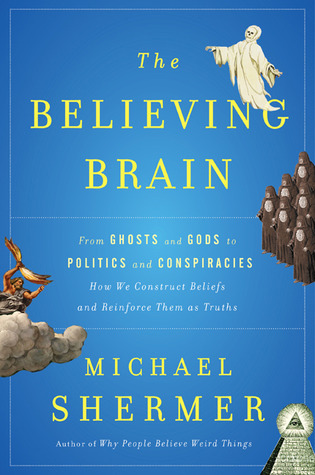More on this book
Community
Kindle Notes & Highlights
If we came to understand—as studies with meditating monks and praying priests have shown—that a part of the parietal lobe of the brain associated with the orientation of the body in space is quiescent during such meditative states (breaking down the normal distinction one feels between self and nonself and thus making one feel “at one” with the environment), wouldn’t this imply that rather than being in touch with a being outside of space and time, it is actually just a change in neurochemistry?
Religion is a social institution that evolved to reinforce group cohesion and moral behavior. It is an integral mechanism of human culture to encourage altruism, reciprocal altruism, and indirect altruism, and to reveal the level of commitment to cooperate and reciprocate among members of a social community. Believing in God provides an explanation for our universe, our world, and ourselves; it explains where we came from, why we are here, and where we are going. God is also the ultimate enforcer of the rules, the final arbiter of moral dilemmas, and the pinnacle object of commitment. It is
...more
We live in an age when science and technology prevail and traditional religions are under fire. Doesn’t it make sense to wrap our angels and gods in space suits and repackage them as aliens?
theories of JFK conspiracies abound, as they do for the assassinations of RFK, MLK Jr., and Malcolm X; the disappearance of Jimmy Hoffa; and the deaths of Princess Diana and assorted rock stars, not to mention conspiracy theories behind the fluoridation of water supplies, jet contrails depositing chemical and biological agents in the atmosphere (chemtrails), the spread of AIDS and other infectious diseases, the dispersal of cocaine and guns to inner cities, peak oil and related oil company suppression of alternative energy technologies, the moon landing that never happened, UFO landings that
...more
The agents behind the pattern of the conspiracy are elevated to near superhuman power to pull it off. We must always remember how flawed human behavior is, and the natural tendency we all have to make mistakes. Most of the time in most circumstances most people are not nearly as powerful as we think they are.
Why do people believe in conspiracies? A useful distinction here is between transcendentalists and empiricists. Transcendentalists tend to believe that everything is interconnected and all events happen for a reason. Empiricists tend to think that randomness and coincidence interact with the causal net of our world and that belief should depend on evidence for each individual claim.
As Kurt Cobain, the rock star of Nirvana, once snarled in his grunge lyrics shortly before his death from a self-inflicted (or was it?) gunshot to the head, “Just because you’re paranoid don’t mean they’re not after you.”
Black Hand,
Much as medical scientists study cancer in order to cure the disease, liberal political scientists study political attitudes and voting behavior in order to cure people of the cancer of conservatism. This liberal belief bias in academia is so deeply entrenched that it becomes the political water through which the liberal fish swim—they don’t even notice it.
And that’s the point. It’s not that any of these social commentators (or many others—the specific examples are not important) are not original thinkers in and of themselves, or that they are not intelligent, educated, and live by the courage of their convictions (they are all of these things and more); it is that when you strap on an ideological belief you slot yourself into a set pattern of specific positions within that belief and parrot those back to your social group—the audience, in the case of public intellectuals—who listen mostly in order to have their own ideological beliefs
...more
In other words, liberals question authority, celebrate diversity, and often flaunt faith and tradition in order to care for the weak and oppressed. They want change and justice even at the risk of political and economic chaos. By contrast, conservatives emphasize institutions and traditions, faith and family, and nation and creed. They want order even at the cost of those at the bottom falling through the cracks.
Nevertheless, the fact that our beliefs are so heavily laden with emotional baggage should give one pause to at least consider the position of others and to be skeptical of one’s own beliefs. The fact that we tend not to do so is a result of some very powerful cognitive biases that work to ensure that we are always right.
“The human understanding when it has once adopted an opinion … draws all things else to support and agree with it. And though there be a greater number and weight of instances to be found on the other side, yet these it either neglects and despises …
Darwin even employed his new science to the history of his own life, as Sulloway explains: “Charles Darwin understood this human predilection for reaffirming the status quo. In his Autobiography he noted how quickly he tended to forget any fact that seemed to contradict his theories. He therefore made it a ‘golden rule’ to write this information down so that he would not overlook it. Like Darwin’s golden rule, hypothesis testing overcomes certain limitations in how the human mind processes information.”
The principle of positive evidence states that you must have positive evidence in favor of your theory and not just negative evidence against rival theories.
The oddest finding in the Pew survey was that 12 percent of atheists and 18 percent of agnostics said that they believe in heaven and—consistent with the wishful thinking self-serving bias—there were lower percentages for belief in hell (10 percent for atheists, 12 percent for agnostics)! Hope springs eternal.


